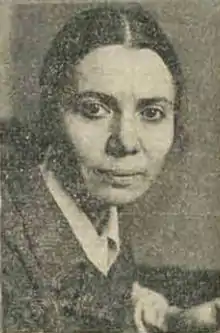Ileana Mălăncioiu | |
|---|---|
 | |
| Born | January 23, 1940 Godeni, Argeș County, Kingdom of Romania |
| Occupation | Poet, essayist, journalist, activist |
| Language | Romanian |
| Citizenship | Romania |
| Alma mater | University of Bucharest |
| Notable awards | Order of the Star of Romania, Commander rank |
Ileana Mălăncioiu (born January 23, 1940)[1] is a contemporary Romanian poet, essayist, journalist, dissident, and activist. She has been a corresponding member of the Romanian Academy since 2013.
Early life and education
Mălăncioiu was born in 1940 in the village of Godeni, in the commune of the same name.[2][3][4][5] Of her birth, she later said, "I was the second daughter born to my parents, and I was not received with much joy. They had expected a boy."[4]
After graduating from the High School for Girls in Câmpulung in 1957,[6] she originally trained as an accountant,[3] then studied at the University of Bucharest's Faculty of Philosophy. She graduated in 1968 with a thesis on Lucian Blaga, then went on to obtain a doctor of philosophy from the university in 1977, writing her doctoral thesis on "Tragic Guilt (Greek Tragedies, Shakespeare, Dostoevsky, Kafka)."[2][4][5]
Career
Mălăncioiu began writing poetry, with her first published verse appearing in the magazine Luceafărul in 1965.[5] She went on to publish over a dozen volumes of poetry, starting with Pasărea tăiată in 1967, and notably including Ardere de tot, Urcarea muntelui, Skärseldsberget, and the anthology Linia vieții.[2][3] She is considered one of Romania's most important poets of the 1960s and '70s.[2] Her work often centers on the trauma of history, while incorporating elements of Romanian rural life, folklore, religion, and literature.[3] Mălăncioiu's poetry has been translated into English, including in the collections After the Raising of Lazarus (2005) and The Legend of the Walled-Up Wife (2012), both translated by Eiléan Ní Chuilleanáin.[7]
In 1980, she became the editor of the magazine Viața Românească, where she published such authors as Constantin Noica and Gabriel Liiceanu, among other members of the Păltiniș school.[4] Before 1989 and the Romanian Revolution, she also worked for the public TV station Televiziunea Română, the magazine Argeș, and the animation studio Animafilm.[4] She faced censorship throughout the communist period, resigning from Viața Românească on March 31, 1988, due to tightening censorship, including of Noica's writing.[4] Her 1985 poetry collection Urcarea muntelui ("The Climbing of the Mountain") was republished in 1992 to reincorporate censored material.[3][4][8] She is well known for her post-1989 political commentary, forceful in her criticism of both Romanian's former leaders and those who succeeded them.[2][3]
After 1989, she worked for the sociopolitical weekly Revista 22, as chief editor of the publishing house Litera, and for the literary magazine România Literară.[4] She was awarded the Order of the Star of Romania, Commander rank, in 2000, for her artistic output and for her efforts to promote Romanian culture.[9] In 2013, she was named as a corresponding member of the Romanian Academy.[2][5]
Selected works
Poetry
- Pasărea tăiată (The Slaughtered Fowl), Editura Tineretului, 1967
- Către Ieronim (Unto Hieronymus), Editura Albatros, 1970
- Inima reginei (The Queen's Heart), Editura Eminescu, 1971
- Poezii (Poems), Editura Cartea Românească, 1973
- Crini pentru domnișoara mireasă (Lilies for Her Ladyship the Bride), Editura Cartea Românească, 1973 (Romanian Academy Prize)
- Ardere de tot (Burnt Offering), Editura Cartea Românească, 1976
- Peste zona interzisă (Across the Forbidden Zone), Editura Cartea Românească, 1979 (Writers' Union of Romania Prize)
- Cele mai frumoase poezii (The Most Beautiful Poems), Editura Albatros, 1980
- Sora mea de dincolo (My Sister Beyond), Editura Cartea Românească, 1980
- Linia vieții (The Line of Life), Editura Cartea Românească, 1982 (Bucharest Writers Association Prize)
- Peste zona interzisă / A travers la zone interdite, Editura Eminescu, 1984 (French-Romanian bilingual anthology with a preface by Eugen Negrici)
- Urcarea muntelui (The Climbing of the Mountain), Editura Albatros, 1985 (Writers' Union of Romania Prize)
- Peste zona interzisă / Across the Forbidden Zone, Editura Eminescu, 1985 (Bilingual anthology with English translation by Dan Duțescu and with a preface by Valeriu Cristea)
- Urcarea muntelui , Editura Litera, 1992 (2nd edition, uncensored and expanded)
- Ardere de tot (anthology), Editura Eminescu ("Poeți români contemporani" series), 1992 (published and unpublished works)
- Skärseldsberget, Hypatia, Stockholm, 1995 (Swedish translation)
- Poezii, Editura Vitruviu, București, 1996 (published and unpublished works)
- Linia vieții (anthology), Editura Polirom, 1999 (complete works and unpublished poems, with a preface by Nicolae Manolescu)
Essays and journalistic writing
- Vina tragică, Tragicii Greci, Shakespeare, Dostoievski, Kafka, Editura Cartea Românească, 1978
- Călătorie spre mine însămi, Editura Cartea Românească, 1987
- Crimă și moralitate (political essays), Editura Litera, 1993
- Cronica melancoliei, Editura Enciclopedică, 1998 (Cluj Book Festival Prize)
- A vorbi într-un pustiu, Editura Polirom, 2002
- Recursul la memorie. Convorbiri cu Daniel Cristea-Enache, Editura Polirom, 2003
- Crimă și moralitate. Eseuri și publicistică, Editura Polirom, 2006
- Am reușit să rămîn eu însămi, Editura Polirom, 2016
References
- ↑ "Mălăncioiu, Ileana (n. 23 ianuarie 1940)". www.radio-arhive.ro (in Romanian). Radio Romania. Retrieved May 6, 2021.
- 1 2 3 4 5 6 Dan, Alina (2013-03-28). "Nicolae Manolescu a fost ales membru titular al Academiei Române". Mediafax (in Romanian). Retrieved 2021-05-05.
- 1 2 3 4 5 6 "Three Poems by Ileana Mălăncioiu". Asymptote. Retrieved 2021-05-05.
- 1 2 3 4 5 6 7 8 "Ileana Mălăncioiu". Nistea (in Romanian). Retrieved 2021-05-05.
- 1 2 3 4 "Documentar: Poeta și eseista Ileana Mălăncioiu împlinește 80 de ani" (in Romanian). Agerpres. 2020-01-23. Retrieved 2021-05-05.
- ↑ Ștefănescu, Alexandru (2000), "La o nouă lectură: Ileana Mălăncioiu", România Literară (in Romanian), vol. 3, retrieved May 6, 2021
- ↑ Doyle, Martin (2016-05-27). "Eiléan Ní Chuilleanáin is new Ireland Professor of Poetry". The Irish Times. Retrieved 2021-05-05.
- ↑ Lazar, Simona (2011-05-02). "Ileana Mălăncioiu și metafora "păsării tăiate"". Jurnalul Național (in Romanian). Retrieved 2021-05-05.
- ↑ "Decretul nr. 524/2000 privind conferirea unor decorații naționale personalului din subordinea Ministerului Culturii". Lege5 (in Romanian). 2000-12-16. Retrieved 2021-05-05.